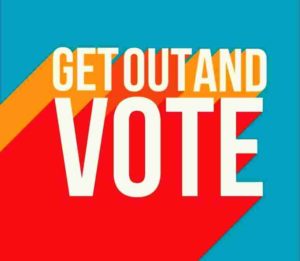
Category Archives: BC Politics
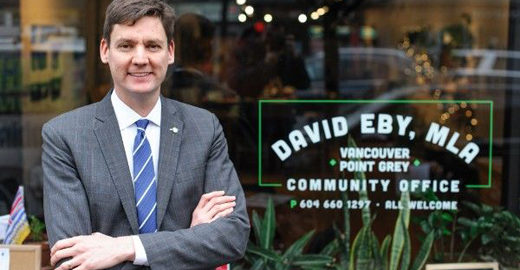
#BCPoli | A Re-Elected David Eby and a BC NDP Majority Government
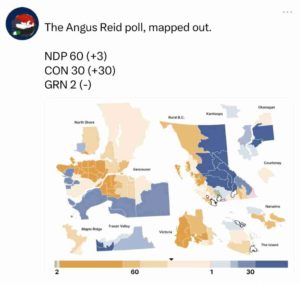 The Angus Reid Institute surveyed 2863 citizens in every riding across the province — online, on the phone and in focus groups — a statistically valid sampling of a representative group of voters in each riding / region of the province, and predicts a majority NDP government will be elected on October 19.
The Angus Reid Institute surveyed 2863 citizens in every riding across the province — online, on the phone and in focus groups — a statistically valid sampling of a representative group of voters in each riding / region of the province, and predicts a majority NDP government will be elected on October 19.
Come 9pm this upcoming Saturday night — October 19th, 2024 — incorporating an up-to-date riding by riding analysis, and a representative cross-sampling of the twenty most reliable polling companies which have weighed in and reported out on the 2024 British Columbia election, VanRamblings has come to believe the good citizens of British Columbia will elect David Eby to a full term of office, as our province’s duly-elected Premier-designate, as the British Columbia New Democratic Party is set to enjoy majority government through the autumn of 2028, with a good prospect of being re-elected to office again that year.
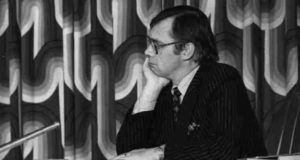
The Honourable Thomas R. Berger, leader of the British Columbia New Democratic Party in 1969.
For a good long while, VanRamblings believed that the BC NDP’s 2024 campaign for office bore a distinct relation to Tom Berger’s failed and far too “intellectual”, professorial and “coldly calculating” NDP campaign for office, in 1969.
VanRamblings no longer believes that to be the case.
Over the course of the past 10 days — in the post-debate period — the conditions of the 2024 BC NDP campaign have been radically reset, as a warmer David Eby has emerged on the campaign trail, no longer providing deadly boring lectur-y and utterly enervating policy pronouncements devoid of humanity.
Instead what British Columbians have seen in televised press conferences held in, for example, Courtenay-Comox, Campbell River and Surrey, is a David Eby who radiates warmth, the David Eby many of us know so well — the David Eby who consistently polled at a 53% approval rating for the past two years, as Canada’s most popular Premier — once again emerging on B.C.’s political stage, humble and comfortable in his skin — not to mention, affable and engaging — while providing the information British Columbians need to know before they cast their ballot.
VanRamblings advised B.C. NDP leader David Eby to be more aggressive on the campaign trail. David Eby, wisely, ignored VanRamblings’ advice, instead saying to himself, “Well, if I’m going to lose this campaign, I’m going to lose it being me, not as some automaton the campaign created.” David Eby has, as we expected would be the case, taken charge of his campaign for re-election over the course of the past ten days, his waggish sense of humour and his love of the province and all of its citizens front and centre in a rejuvenated and re-energized B.C. NDP campaign.
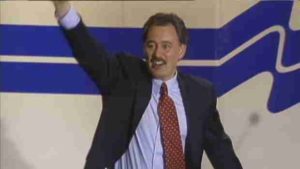
BC NDP leader Glen Clark emerges victorious and Premier-designate in 1996’s British Columbia election
Then we got to thinking, “If the correlation between the failed 1969 BC NDP campaign and the 2024 BC NDP campaign for office doesn’t hold water, what about the 1996 election, when Glen Clark became Premier, in spite of the fact that Gordon Campbell’s insurgent B.C. Liberal party garnered 43% of the popular vote to Mr. Clark’s 39% of the vote, yet due to ‘voter efficiency,’ the British Columbia New Democratic Party would form and hold government from 1996 through 2001?”
The BC NDP in 2024 have consistently polled five points ahead of the BC Conservatives. What if a situation occurred in 2024 that, although the BC NDP is polling ahead of the BC Conservatives, on a riding-by-riding basis and in the targeted riding campaign BC Conservative co-campaign manager, Dimitri Pantazopoulos has run, BC Conservatives pull ahead on the seat count on election night to form government, despite winning fewer votes than their BC NDP rival?
Nah, we concluded. Too many differences between the 1996 and 2024 campaigns.
The upstart BC Conservatives are running a seat-of-their-pants election, devoid of a GOTV (Get Out the Vote) electoral machine necessary to win government, with much less money, many more untried candidates, and in a campaign that is rife with … see below as to what we believe to be a more relevant campaign correlation that may well inform the outcome of the 2024 British Columbia election.
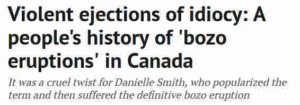
On March 26th of this year, VanRamblings published a prescient column titled, Bozo Eruptions Disrupt Election Campaign, where we tracked then Alberta Wildrose party leader Danielle Smith’s failed bid for office.
See if you don’t think that there’s a correlation between Danielle Smith’s failed 2012 campaign for office, and the BC Conservative’s calamitous 2024 campaign.
As Stuart Thompson wrote, at the time, in The National Post …
It is a surefire rule of politics that at any given moment, somewhere in Canada a bozo is about to erupt.
Just as a political campaign is looking to flip the script, or turn the corner, or recapture the narrative, some bozo will ruin it for them, prompting damage control, tearful apologies, or, in the most severe cases, a resignation.
The bozos simply can’t stop themselves from erupting.
Conservative strategist Tom Flanagan, who ran Smith’s 2012 campaign, oversaw one of the most memorable stretches of bozo eruptions in Canadian political history: Smith wanted a big tent party, and open and unvetted candidate nominations.
Two days after the 2012 election was called, a Wildrose candidate’s year-old blog post was unearthed declaring that all gays were destined for a “lake of fire”. Smith refused to rebuke her candidate, saying the party “accepts a wide range of views.” And the hits just kept on comin’ for the Wildrose campaign, as day after day after day, a new candidate bozo eruption garnered front page coverage, and the lead story status on the evening news.
Danielle Smith’s dreams of becoming the Wildrose Premier were dashed, the party 20 points behind their polling on Election Day.
Danielle Smith’s failure to rebuke a candidate. Kind of sounds like BC Conservative Party leader John Rustad, who has consistently refused to censure any racist, intolerant, misogynist and homophobic utterance by any of his candidates.
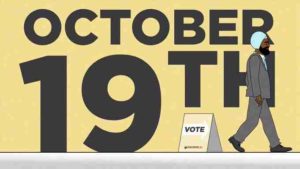
What does the above have to do with British Columbia’s October 19th election?
Everything.
From the day after the Leaders’ Debate through until today, the BC Conservative campaign has been dogged by the shocking controversy surrounding their Surrey South candidate, Brent Chapman, such that the entire focus of leader John Rustad’s campaign for office has not been on the issues he’s raised at the daily press conferences he has held over the past week. Talk about being off message.
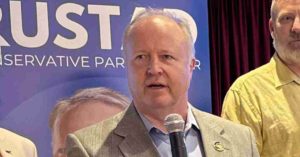
Brent Chapman, the B.C. Conservative Party’s Surrey South candidate, has said that what happened at residential schools is a “massive fraud”, called for a “boycott” of Air Canada to stop airlifts of Syrian refugees, questioned high profile mass shootings such as Sandy Hook elementary school where 20 children were murdered, while denying the white nationalist terrorist attack on a Québec City mosque.
Think of Rustad’s BC Ferries press conference, which got buried in an avalanche of questions put to the leader about whether Brent Chapman would be allowed to continue as a candidate for the BC Conservative Party in the riding of Surrey South.
The entire focus of reporter questions related to the ongoing, disastrous Brent Chapman fiasco, with no questions whatsoever on the BC Conservative plan for BC Ferries, or on subsequent days on the BC Conservative issue of the day, as the BC Conservative campaign was consistently held off message.
Can you say, devastating, calamitous, detrimental, hapless and noxious?
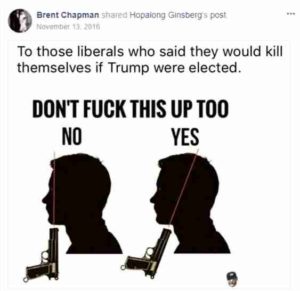
Chapman also shared a graphic posted by a far-right meme account.
The graphic features images of two handguns and the silhouettes of two heads.
“To those liberals who said they would kill themselves if Trump were elected,” the graphic states. “Don’t fuck this up too.”
The graphic suggests “liberals” should aim the gun at the centre of their brain rather than at their chin, an apparent reference to how best to commit suicide.
The most damning Chapman post — and destructive to the BC Conservative campaign — occurred surrounding the resurfacing of past statements demonizing Muslims and Palestinians, accusing them of “inbreeding.”
2. Mr. Chapman has many opinions on people of the Muslim faith. Here he refers to Muslims as, “little inbred walking, talking, breathing time bombs…” #bcpoli #vanpoli #cdnpoli pic.twitter.com/pPXC2Ze06K
— Jas Johal (@JasJohalBC) October 10, 2024
Why destructive to the BC Conservative campaign? Well, just see above.
Also, because 43% of the voters in the Surrey-Cloverdale riding where former BC United MLA, Elenore Sturko, who joined the BC Conservatives in June — who, only two weeks ago was polling at 56% in the riding, as Brent Chapman’s extremist anti-Muslim rants came to light has seen her potential to win the riding evaporate, as NDP incumbent Mike Starchuk, with the full support of the 43% Muslim electorate, is now set to win the riding Saturday night, and re-election to the BC Legislature.
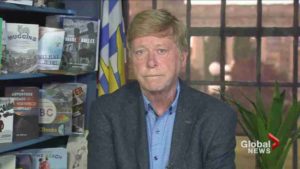
Keith Baldrey, veteran Global BC Legislative reporter
On Mike Smyth’s CKNW talk show, Global BC reporter Keith Baldrey stated that Elenore Sturko was fully aware of Brent Chapman’s extreme views before she decided to run alongside him, as Ms. Sturko described Chapman as “an extremist” and a “QAnon conspiracy theorist” shortly before she defected.
“A week before Sturko made her jump, her announcement that she’s going to join the BC Conservatives, I ran into her in the Legislature library. And in my Facebook feed was suddenly a video from Brent Chapman and it was sort of about his candidacy. And I didn’t know him, I didn’t know he was married to (federal Conservative MP) Kerry-Lynne Findlay … I said to Sturko, “Oh, so you’re running against an actor?” And she says, “Oh, this guy, he’s a…” and she called him “an extremist,” said he was a ‘QAnon conspiracy theorist, that he’s crazy, you know.’ And at that point, she was still a member of BC United.” (CKNW, Oct 10)
All of the unsettling and disturbing news that has emanated from the BC Conservative campaign, following a dreadful — what CHEK-TV reporter Rob Shaw called a cadaver-like — Leaders’ Debate performance by John Rustad, giving the “win” to David Eby at 48%, with only 32% support for John Rustad, has caused the BC Conservative campaign not only to stall, as the party continues to lose momentum and more and more voter support with each passing day, but to recede, or perhaps even collapse, making a BC Conservative win on Saturday, at best unlikely.
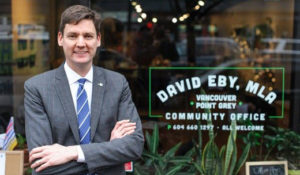
As occurred in 2012 during that year’s Alberta election, come Election Day when Danielle Smith’s Wildrose Party lost 16 percentage points in support due to the day after day, drip by drip revelations of racism, intolerance and the hate espoused by many of her candidates, VanRamblings believes, come Saturday, when the vast majority of British Columbians will cast their ballot at the polls, British Columbians of conscience will make the decision to cast their ballot for the principled candidate for Premier, David Eby, and a British Columbia New Democratic Party where you have heard nary a whisper of intolerance, because as British Columbians we realize when we enter our local polling station, the only reasonable political party to vote for to form government will be the British Columbia New Democratic Party.
You’ll want to watch / listen to what former BC NDP Premier Glen Clark has to say about the 2024 British Columbia provincial election. If you don’t see the Hotel Pacifico podcast YouTube video above, you can listen to it here or here or here.
#BCPoli | Where the B.C. New Democratic Party Campaign Has Failed, Pt. 1
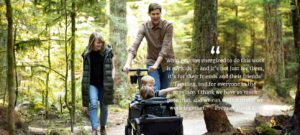
As of this writing, David Eby’s British Columbia New Democratic Party and John Rustad’s Conservative Party of B.C. are, according to the latest polling, in a statistical dead heat in their respective bids to form the next government in our province.
The 2024 British Columbia New Democratic Party (B.C. NDP) campaign has faced criticism for its perceived ineffectiveness and inability to connect with the broader concerns of British Columbians, in a campaign that has clearly not resonated with a broad swath of voters, leaving the B.C. NDP campaign in the doldrums.
Despite Premier David Eby’s personal appeal — which he emphasizes in campaign materials, with images of his family and messages of hope for future generations — the B.C. NDP campaign has failed to effectively counter the momentum that has been building for weeks for John Rustad’s upstart, unschooled B.C. Conservatives, failing to effectively respond to critical issues like the rate-of-inflation cap on rents, which Rustad has said a B.C. Conservative government would repeal and revoke.
Today on VanRamblings, we will seek to address one of the primary weaknesses of the B.C. New Democrat’s current campaign for office.
Tomorrow, we’ll look at the B.C. NDP’s poorly designed and executed advertising strategy, and the B.C. NDP’s broader inability to engage with British Columbians.
On Friday, we’ll offer some prescriptive fixes for the B.C. NDP’s failing campaign.
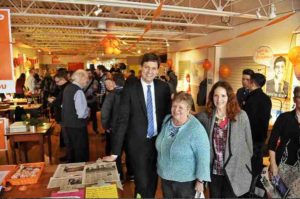
David Eby’s 2017 campaign office opening, attended by more than 400 constituents and supporters
Campaign offices located in a neighbourhood within the Riding
There was a time when the New Democratic Party was a grassroots party.
No longer, it seems.
In 2024, as a “cost saving measure” the B.C. New Democrats have chosen not to open easily accessible neighbourhood riding offices available to the public. Instead, the NDP campaign team made the wrong-headed decision to create campaign offices that would accommodate candidates running in six different ridings.

David Eby in attendance at his tiny “campaign office” — which he shares with 5 other NDP candidates
In 2024, David Eby shares a tiny, largely inaccessible and out of the way campaign office, a campaign office outside of the ridings of Vancouver-Yaletown NDP candidate Terry Yung, Vancouver-South Granville NDP MLA Brenda Bailey, Vancouver Quilchena NDP candidate Callista Ryan, Vancouver-Little Mountain NDP candidate Christine Boyle, and Vancouver-West End MLA, Spencer Chandra Herbert.
Seems the B.C. New Democrat brain trust arrived at the conclusion prior to the outset of the 2024 B.C. NDP campaign that John Horgan’s 2020 B.C. NDP online campaign proved to be such a wild success — with the B.C. NDP electing 57 MLAs — clearly, an online campaign out of necessity, arising from the fact that in 2020 the world was in the throes of the deadly COVID-19 pandemic, the prevailing wisdom:
“Hey, it worked once, and worked very well. Let’s try it again in 2024, and save ourselves some big bucks in the process, money we can pour into media buys.”
What tragic, non-thinking, utterly wrongheaded campaign destroying nonsense.
In case you were wondering senior B.C. NDP campaign folks, in 2024 we are no longer in the midst of a deadly pandemic.
Sure, COVID is still around, but for the most part, folks have stopped wearing masks, and getting together in enclosed spaces has once again become de rigeur.
Stalwart members of the New Democratic Party would relish the opportunity to get together with the friends they’ve made in their riding over the years — camaraderie and human contact counts for something, y’know. But the brain trust running the 2024 NDP campaign, well … they’ve got better ideas, it would seem. Alas.
In each of the four David Eby campaigns VanRamblings has worked on, in 2011 and 2013 managed by the incredible and monumentally-skilled Kate Van Meer-Mass, and in 2017 by the equally wonderful Gala Milne (no 2020 campaign manager required, arising from the pandemic), here’s how things worked, effectively and well.
-
- We’ll use 2017 as an example. Gala Milne, as we say above, very effectively managed David Eby’s 2017 campaign for office. Danika Skye Hammond co-ordinated and inspired the 400 outside volunteers — who were out door knocking from early morning til 8pm, as well as those delivering pamphlets and other campaign literature, and arranging daily, well-attended burmashaves — while Chris did the same for the 200 inside volunteers, operating the phone room 9am til 9pm daily, responsible for ensuring David Eby signs were delivered four times a day, while overseeing inside volunteers.
- In addition, there was a media team (social media, photo and videographers), a fundraising team, office staff, and a crew who kept the troops fed.
At David Eby’s campaign office opening in 2017, four hundred constituents and supporters attended at the campaign office, collectively with thousands of dollars in their pockets to donate to David’s campaign. The enthusiasm for David’s re-election was palpable — 400 people who would spend the next four weeks getting the vote out, and supporting David Eby’s re-election bid in any way the could.
in 2024, at David Eby’s out of the way campaign office opening, constituents were not invited to attend at the tiny space outside of the riding. Only the candidates, their spouses and their children, and campaign staff were allowed to attend.
What a godawful B.C. NDP campaign mistake, foregoing the invaluable and necessary opportunity to inspire constituents, and to raise thousands of dollars.
In 2011, 2013 and 2017, David Eby’s campaign office was a magnet for community participation in his election, and later for re-election.
You could feel the enthusiasm and good will from inside the campaign office wafting out into the street, and from there throughout the neighbourhood. Hundreds of people came by, dropped into the office, chatted, ate some of the food Susan Walsh prepared (Susan — whose husband Michael Walsh, the lead film critic at The Province for 40 years, passed on January 3rd this year — was told her services would not be required this year, a cruelty beyond all measure, in our estimation).
-
- VanRamblings worked a 4-hour front desk shift midday Monday through Friday, and sometimes on the weekend, this in addition to attending burmashaves, going door knocking, delivering literature, and distributing David Eby campaign signs. David Eby’s campaign office was abuzz with activity at least 12 hours a day. Folks came in off the street to ask questions, to see if arrangements could be made to meet with David — such requests almost always accommodated.Constituents picked up their David Eby campaign sign, or two.
- And most wonderfully of all, people came in off the street — even people who didn’t live in the riding — to drop off $200 in cash, or $500 in bills, which they were only too glad to hand over in support of the re-election of “that wonderful young man, David Eby.” Of course, as we together filled out all of the proper forms — campaign staff would have been apoplectic if we didn’t follow Elections B.C. donation guidelines — we must have raised five to ten thousand dollars each week of the campaign, just from folks walking in off the street.
This was grassroots, community-involved election campaigning at its very finest.
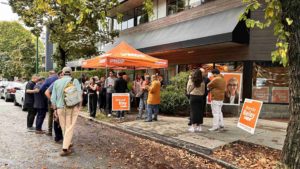
But not in 2024. No siree. The B.C. NDP campaign team is saving money, don’tcha see, while destroying grassroots, riding by riding constituent enthusiasm for their candidates, where everything is done online.
We ordered two David Eby campaign signs 9 days ago. When they hadn’t arrived by last Thursday, we contacted the office (by e-mail, of course, because there’s no talking to real human beings in the 2024 B.C. NDP campaign), and here we are on Wednesday, October 2nd, and no David Eby signs for VanRamblings to put up.
Should the British Columbia New Democrats lose this election — which seems to be a real possibility — it will have occurred, at least in part, as a consequence of the arrogant and condescending decision by the senior B.C. NDP campaign team to “combine” campaign offices, rather than opening an accessible campaign office in each constituency, a maladroit decision of immense and regrettable proportion.
Politics is a people business. The B.C. New Democratic Party campaign for office in 2024 seems not to understand this fundamental principle of politics.

#BCPoli | Ridings in Contention in the Interior, the North & the Kootenays
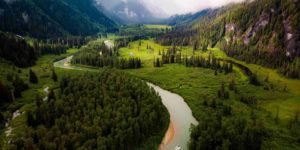
With the 2024 British Columbia election now underway, several key ridings in the Interior of the province, including in the Okanagan, the Kootenays, and northern British Columbia look to play pivotal roles in determining the overall outcome.
These regions are historically less urbanized, with a mix of rural and resource-based economies, making them more politically diverse. The B.C. New Democratic Party (NDP), the resurgent B.C. Conservative Party, and a handful of high-profile Independents, including former B.C. United MLAs, are all vying for influence.
The B.C. Conservative Party, under leader John Rustad, is expected to make significant gains, particularly in the more conservative and rural areas of the province.
The party has capitalized on growing discontent with both the B.C. NDP government and the now virtually defunct B.C. United.
With Rustad steering the party towards a platform that resonates with socially conservative and populist voters, the B.C. Conservatives could emerge as the dominant opposition in the northern and Interior ridings.
In regions like the Okanagan and the Kootenays, where small-c conservative values have a strong foothold, the B.C. Conservatives are expected to gain traction.
Here we go!!! #bcpoli pic.twitter.com/qYpnKPT5IT
— Mike Bernier (@Mike_A_Bernier) September 21, 2024
In ridings such as Peace River North and Peace River South, long-time former B.C. United MLAs Dan Davies and Mike Bernier, respectively, are now running as Independents.
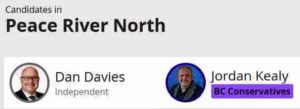
To read Vote Mate candidate profiles of the Peace River North candidates, click here.
These ridings, which have traditionally voted conservative, will see fierce competition between these Independents, and the B.C. Conservative candidates.
If the vote splits between Independent conservatives and the B.C. Conservatives, it could allow the B.C. NDP to secure an unexpected victory — if they were running a candidate in either riding, which as of this writing they most decidedly are not. The B.C. NDP must figure it’s a lost cause.
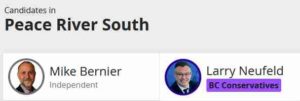
To read Vote Mate candidate profiles of the Peace River South candidates, click here.
As we say above, former B.C. United MLAs running as Independents could significantly impact the political dynamics in their respective ridings.
I’m officially running for re-election as MLA for Prince George-North Cariboo as an independent! I’ve heard loud and clear that we need a voice that reflects our values and offers a centrist option in this important election.
As an independent MLA, I will fight for the same… pic.twitter.com/0bIWqUsUIE— Coralee Oakes (@coraleeoakes) September 21, 2024
These candidates carry local recognition and established track records, but the collapse of B.C. United has left a vacuum that both the B.C. Conservatives and NDP are seeking to fill. The presence of high-profile Independent candidates, such as Bernier in Peace River South, Dan Davies in Peace River North, Coralee Oakes in Cariboo North, and Tom Shypitka in Kootenay-Rockies, could lead to a fragmentation of the right-leaning vote.
Mike Bernier, for example, has deep roots in Peace River South, and his decision to run as an Independent is likely to retain a significant portion of his previous support. However, he faces competition from a growing B.C. Conservative presence in the area. Similarly, Coralee Oakes in Cariboo North may siphon votes away from the B.C. Conservative candidate, potentially paving the way for a closer contest with the B.C. NDP.
Before we leave the North, let’s take a look at …
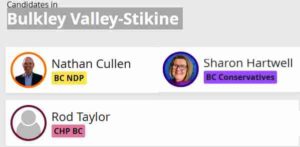
Bulkley Valley-Stikine. The Stikine has been in the NDP column since 2009 with Doug Donaldson. Prior to 2009, Bulkley Valley-Stikine had been held by Dennis McKay of the B.C. Liberals. It’s the smallest riding in the province by population, and the largest by geography. The NDP’s Nathan Cullen is the MLA for the riding, which he won handily in 2020, following a 15-year stint as the shadow Finance Critic for the federal New Democratic Party. As was the case in 2020, Rod Taylor, the head of the Christian Heritage Party, is running again; generally, he receives about 10% of the vote. Although not announced as of this writing, word is that the B.C. Greens will run an Indigenous candidate who has been active in the anti-pipeline movement. Stir that all around, and Bulkley Valley-Stikine could very well turn into a horse race. One to keep an eye on.

Skeena. Pair this riding with Bulkley Valley-Stikine and this could be a pick up for the NDP, now that Ellis Ross — who had held the riding for B.C. United — has jumped to the federal Conservatives, where he’ll run as a federal candidate in the Skeena riding. Sarah Zimmerman who has deep roots in Skeena, and currently sits as an elected Terrace City Councillor and was the former Executive Director of Communications for Coast Mountain College is considered to be a very strong candidate in the riding. Expect David Eby to spend time in both ridings, to secure two victories in the North.
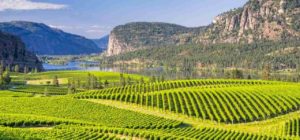
In the Okanagan, where former B.C. United candidates Ashley Ramsay (Kelowna-Mission), Dr. Michael Humer (Kelowna Centre), Tracy St. Claire (Penticton-Summerland), and Kevin Acton (Vernon-Lumby) are now running as Independents, the political landscape is equally complicated.
New ad! pic.twitter.com/zHy0XNPOO2
— Kevin Acton (@votekevinacton) September 19, 2024
The Okanagan is traditionally conservative, but the vote-splitting between Independents and B.C. Conservative candidates could offer opportunities for the NDP, particularly in historically competitive ridings such as Vernon-Lumby, which the NDP won in 2020. Acton’s candidacy will face pressure from both the B.C. NDP and a surging B.C. Conservative base. If the vote splits, it could swing the riding back into NDP control, or allow the B.C. Conservatives to make gains.
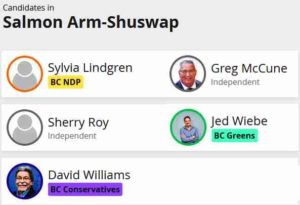
To read Vote Mate candidate profiles of the Salmon Arm-Shuswap candidates, click here.
In Salmon Arm-Shuswap, Greg McCune’s Independent bid will face similar dynamics. This riding has a deeply conservative base, but with B.C. Conservatives gaining momentum, vote-splitting could alter the outcome.
The Kootenay Ridings: NDP vs. B.C. Conservatives
In the Kootenays, the B.C. NDP has traditionally done well, especially in ridings like Kootenay West and Kootenay-Rockies, where progressive and environmentally-focused voters dominate. However, the B.C. Conservatives are working to broaden their appeal in these areas by emphasizing opposition to government overreach, particularly on resource management and rural development issues.
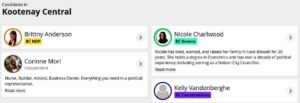
To read Vote Mate candidate profiles of the Kootenay-Central candidates, click here.
The B.C. Greens have historically been a strong force in Nelson and surrounding areas, appealing to environmentally conscious voters who support sustainable resource management and climate action. In ridings like Kootenay-West (the old Nelson-Creston riding) the Greens are expected to remain a key player, with potential to siphon votes away from the B.C. NDP. However, it is unlikely that the B.C. Conservatives will gain significant traction here due to the progressive nature of the electorate.
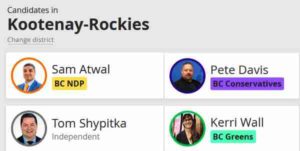
To read Vote Mate candidate profiles of the Kootenay-Rockies candidates, click here.
In Kootenay-Rockies, Tom Shypitka’s decision to run as an Independent, having previously been a B.C. United MLA, will complicate the conservative vote. The B.C. Conservatives are likely to perform well in this region, but Shypitka’s local popularity could create a fragmented right-leaning vote, giving the NDP a chance to maintain or even expand their influence.
The Kamloops Ridings
Kamloops has historically been a battleground, with ridings like Kamloops-North Thompson and Kamloops-Centre frequently seeing close contests.
The B.C. Conservatives, emboldened by their recent growth, are aiming to make headway in these ridings.
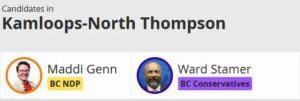 To read Vote Mate candidate profiles of the Kamloops-North Thompson candidates, click here.
To read Vote Mate candidate profiles of the Kamloops-North Thompson candidates, click here.
In Kamloops-North Thompson, where rural concerns about resource industries and housing affordability dominate, the B.C. Conservatives are expected to perform well, potentially at the expense of the B.C. NDP.
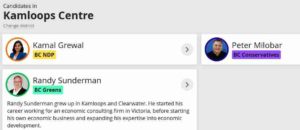
To read Vote Mate candidate profiles of the Kamloops-Centre candidates, click here.
Kamloops-Centre, with a more urban electorate the Conservatives could retain the seat with former B.C. United / B.C. Liberal candidate Peter Milobar holding down the fort for the Conservatives, unless voters disillusioned with both the remnants of B.C. United. and decide to cast their ballot for a reinvigorated B.C. New Democratic Party.
The 2024 B.C. election in the Interior, Okanagan, Kootenays, and the North is shaping up to be one of the most competitive in recent history.
The B.C. Conservatives are positioned to make significant gains, particularly in more rural, conservative-leaning ridings. However, the presence of high-profile Independents, especially former B.C. United MLAs, adds complexity to the race, creating the potential for vote-splitting and unexpected outcomes.
The B.C. Greens will remain strong in progressive enclaves, particularly around Nelson, while the B.C. NDP faces the challenge of defending its gains from 2020 in the face of a re-energized conservative movement.
As of today, we are 25 days away from October 19th Election Day.
2024 British Columbia Provincial Election | Regional Riding Analysis

Part 1 | Vancouver Island | Five Ridings in Contention, and Subject to Change
The Hotel Pacifico podcast will broadcast daily, Monday thru Friday, throughout the 2024 election
The good folks at Air Quotes Media’s Hotel Pacifico podcast — featuring Mike McDonald, Christy Clark’s campaign manager in 2013; Geoff Meggs, Premier John Horgan’s Chief of Staff; and Kate Hammer, a former Globe and Mail British Columbia legislative reporter — will “broadcast” on the B.C. Election each day, Monday through Friday.
VanRamblings will post the podcast, for your edification and enjoyment.